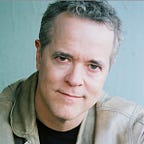The embedded player at the top of this page doesn’t feature a vocal reading of this article. It’s rather an unhurried interview with British astronomer Stephen Webb (as well as some intro and outro material) about one of the most fascinating scientific puzzles to ever face humanity: Fermi’s paradox.
Approaching the paradox begins with a detailed appreciation for both the immensity and the age of our galaxy (or — if you want to go huge — the observable universe). The Milky Way contains at least a hundred billion stars, and perhaps four times as many. Over the past few decades, we’ve learned that almost all stars have planets. And since 2009, the Kepler space telescope has established that many stars have planets within with the “habitable zone,” which can support life as we know it (a discovery that surprised many). This means there are billions of life-friendly planets out there. And we’ve long known that life emerged on Earth almost immediately after things settled down enough to allow it.
If you conclude from all this that life is abundant out there (which is a leap, but an entirely reasonable one), other advanced civilizations become plausible. Experts say these could have arisen starting six billion years ago, when enough heavy elements had accrued to support complex life and technology throughout the universe.
And so the time dimension enters our analysis. If spacefaring civilizations could have just as easily emerged billions of years ago as today, some of them should be spectacularly more advanced than we are. We got from Kitty Hawk to the moon in 66 years, and will soon be on Mars (talk to Elon if that sounds improbable). So any Milky Way species with a serious jump on us should have gotten here when our ancestors were still prokaryotic bacteria. The most conservative colonization models suggest that a spacefaring civilization would fill the galaxy in far less than 100 million years. Many civilizations could have arisen dozens of times deeper in the past than that — so where is everybody?? Those three words embody Fermi’s paradox. And they’re the title of Stephen Webb’s book, which explores 75 logical answers to this question.
And this is a burning question for all of us — not just science fiction writers like me! Why? Because one of the most powerful answers is that no civilization ever survives the adolescence that humanity entered with the bombing of Hiroshima. It would sure be comforting to know this is not the paradox’s solution — which partly explains why many brilliant people spend their careers searching for proof of alien life.
Stephen and I don’t discuss the full set of solutions to the paradox (our interview isn’t that unhurried). But we do discuss several, as well as the three broad categories that all of them fall into. The first is that aliens are already here — or were here in the past. Fans of UFOs, the X-Files, and tales of spacemen building the pyramids will enjoy these solutions. The next category — the most popular amongst astronomers — is that there are many alien civilizations out there, but none have popped around yet for a variety of reasons. The third category — chilling on the surface, yet arguably optimistic — is that there are no other advanced species. That we’re truly, entirely alone in the galaxy, if not the universe.
This is one of eight recordings that I’m premiering to Medium members, then pushing out to the world (roughly three weeks later) as part of a podcast series that wraps context around my new novel After On (note: it’s NOT necessary to read the novel in order to listen to and learn from these episodes). I’m increasingly likely to continue creating new episodes after the first eight are out there. If I do, all will go out to the public immediately, and the podcast will graduate from its loose affiliation with my novel, to the broader mandate of “unhurried conversations with thinkers, founders, and scientists.”
If you like the sound of this, you may wish to subscribe to the podcast. To do so, just type “After On” into your podcast app’s search field. Or, to subscribe in iTunes from your computer, click here, then click the blue “View on iTunes” button in the upper left corner of the page (requires iTunes, of course). Alternatively, you can follow the RSS feed http://afteron.libsyn.com/rss
